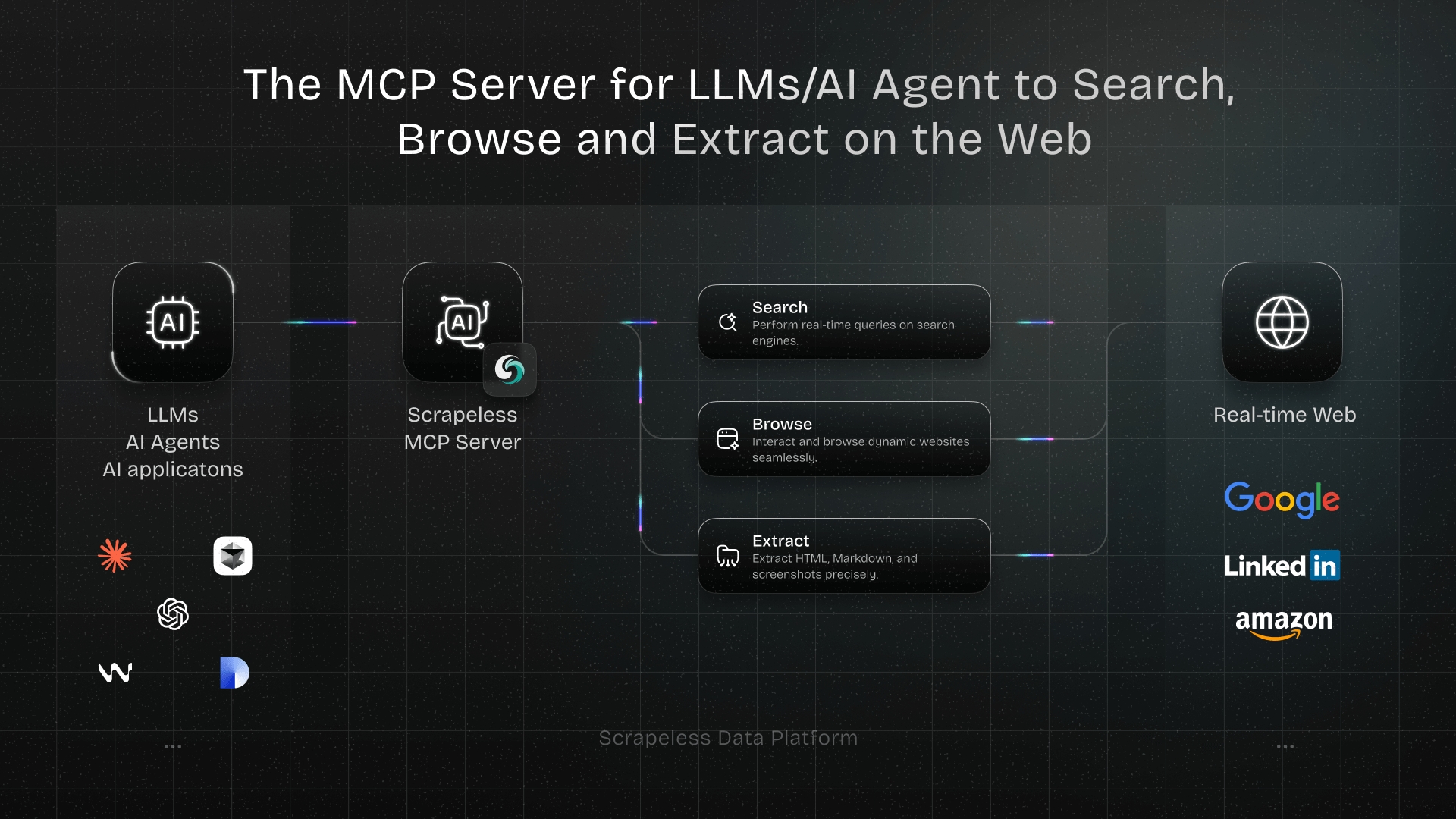使用Scrapeless进行产品研究:深入探讨Labubu与Google搜索API
Advanced Data Extraction Specialist
介绍
像 Labubu 这样的新产品评估不只是浏览几个网页那么简单。要进行有意义的调研,尤其是在数据驱动决策时,你需要信息的深度、规模和结构化处理能力。这正是 Scrapeless 的高级 Google 搜索 API 发挥作用的地方。
在本指南中,我们将引导你如何利用 Scrapeless 的能力进行全面的产品调研,获取关于用户情绪、技术规格、价格等方面的洞察。
为什么使用 Scrapeless 进行产品调研?
Scrapeless 的 Google 搜索 API 允许你以编程方式查询 Google Search,并返回结构化的可操作结果。无需手动打开几十个标签页,Scrapeless 会将一切内容以整洁的 JSON 格式呈现,并且完全匹配你的查询条件。
这对产品调研尤其有用,你通常需要:
- 对比竞品功能
- 理解真实用户体验
- 跟踪评论和论坛中的情绪
- 分析产品在市场中的定位
开始之前
开始使用前,请确保你具备以下内容:
- 有效的 Scrapeless API Token(可在你的仪表盘中申请)
- 安装 Python 3.x(或其他脚本环境)
- 一份关于 Labubu 的清晰搜索问题清单
以下是一些以产品为中心的查询示例:
"Labubu 的定价模型""Labubu 的功能列表""Labubu 的性能测试""Labubu 的 API 稳定性""Labubu 的集成经验""Labubu 与替代产品的对比"
这些查询分别对应于调研中的关键方面,无论是价格、技术能力还是竞争态势。
将搜索结果转化为洞察
当你收到 Scrapeless 返回的搜索结果后,可以:
- 解析内容,提取产品细节
- 整合模式,识别多渠道中的共性信息
- 评估情绪,通过用户反馈得出评分
- 追踪变化,随时间演变监测产品声量
Scrapeless 提供的是一个自动化、可复用的流程,既减轻了人工研究负担,又提升了调研深度与精度。
了解产品功能和技术规格
使用 Scrapeless Google 搜索 API,你可以运行以下搜索:
"Labubu 的定价模型""Labubu 的功能列表""Labubu 的性能测试""Labubu 的 API 稳定性""Labubu 的集成经验""Labubu 与替代产品的对比"
这些有助于你评估
- 产品能力
- 技术稳定性
- 团队的集成难易程度
你甚至可以添加自动比较逻辑,例如:
Labubu vs \[竞品名称]
这样可以让你了解 Labubu 在整个生态中的位置。
衡量用户满意度和情绪趋势
规格参数固然重要,但 用户反馈 同样关键。
Scrapeless 让你轻松实现情绪搜索自动化:
"Labubu 值得购买""Labubu 强烈推荐""Labubu 用户体验"
这些查询可从以下来源中提取信息:
- 博客
- 论坛
- 评价网站
你可以通过统计正面与负面关键词出现次数,建立基础情绪评分模型。
获取专家观点与深入分析
想获得更专业的视角?可以尝试结构化查询:
"Labubu 的专家评测""Labubu 的案例研究"
这些能帮助你发现:
- 来自分析师的反馈
- 企业实际使用情况
- 产品质量的长期评估
这比客户评论提供了更具战略性的分析维度。
加分项:用于评分 Labubu 的 Python 脚本
为了进一步增强你的研究流程,我们提供了一个基础 Python 脚本,它可以:
- 通过 Scrapeless API 发送查询
- 统计匹配正面/负面情绪关键词的结果数量
- 返回一个基础情绪评分,反映公众认知
你需要准备:
- 安装 Python 3.x – 点此下载
- 有效的 Scrapeless API Token – 在代码中替换
SCRAPELESS_API_TOKEN - 安装
requests库 – 终端输入:pip install requests
运行脚本后,它会在控制台输出结果,并生成一个结果文本文件。
Python Script ( labubu_research_script.py )
language
import json
import requests
SCRAPELESS_API_TOKEN = "SCRAPELESS_API_TOKEN"
def search_google_with_scrapeless(query, gl="us", hl="en", google_domain="google.com", num="10"):
"""Performs a Google search using the Scrapeless API and returns the JSON response."""
host = "api.scrapeless.com"
url = f"https://{host}/api/v1/scraper/request"
headers = {
"x-api-token": SCRAPELESS_API_TOKEN
}
json_payload = json.dumps({
"actor": "scraper.google.search",
"input": {
"q": query,
"gl": gl,
"hl": hl,
"google_domain": google_domain,
"start": "0",
"num": num
}
})
try:
response = requests.post(url, headers=headers, data=json_payload)
response.raise_for_status() # Raise an exception for HTTP errors
return response.json()
except requests.exceptions.RequestException as e:
print(f"Error during API request: {e}")
return None
def get_result_count(query):
search_results = search_google_with_scrapeless(query, num="1") # Only need 1 result to get total_results
if search_results and "search_information" in search_results:
# Scrapeless API might not have spelling_fix, so we rely on total_results
return int(search_results["search_information"].get("total_results", 0))
return 0
def negative_queries(product_name):
return [
f'"{product_name} broken"',
f'"{product_name} defective"',
f'"{product_name} quality issues"',
f'"{product_name} paint chipping"',
f'"{product_name} fragile"',
f'"{product_name} easily damaged"',
f'"{product_name} not as pictured"',
f'"{product_name} disappointed with"',
f'"{product_name} regret buying"',
f'"{product_name} waste of money"',
]
def positive_queries(product_name):
return [
f'"{product_name} cute"',
f'"{product_name} adorable"',
f'"{product_name} well-made"',
f'"{product_name} high quality"',
f'"{product_name} great design"',
f'"{product_name} perfect gift"',
f'"{product_name} highly collectible"',
f'"{product_name} worth the price"',
f'"{product_name} love my"',
f'"{product_name} recommended"',
]
def conduct_labubu_product_research_with_scoring():
product_name = "Labubu"
negative_markers = 0
positive_markers = 0
print(f"Searching for product: {product_name}\n")
print("Negative results found:")
negative_results_output = []
for query in negative_queries(product_name):
count = get_result_count(query)
if count > 0:
negative_markers += 1
negative_results_output.append(f'\"{query}\": {count}')
print(f'\"{query}\": {count}')
if not negative_results_output:
print("none")
print("\nPositive results found:")
positive_results_output = []
for query in positive_queries(product_name):
count = get_result_count(query)
if count > 0:
positive_markers += 1
positive_results_output.append(f'\"{query}\": {count}')
print(f'\"{query}\": {count}')
if not positive_results_output:
print("none")
score = positive_markers - negative_markers
print(f"\nNegative markers: {negative_markers}")
print(f"Positive markers: {positive_markers}")
print(f"Score: {score}")
# Save the output to a file for later inclusion in the article
with open("labubu_scoring_output.txt", "w", encoding="utf-8") as f:
f.write(f"Searching for product: {product_name}\n\n")
f.write("Negative results found:\n")
if negative_results_output:
f.write("\n".join(negative_results_output) + "\n")
else:
f.write("none\n")
f.write("\nPositive results found:\n")
if positive_results_output:
f.write("\n".join(positive_results_output) + "\n")
else:
f.write("none\n")
f.write(f"\nNegative markers: {negative_markers}\n")
f.write(f"Positive markers: {positive_markers}\n")
f.write(f"Score: {score}\n")
if __name__ == "__main__":
conduct_labubu_product_research_with_scoring()运行脚本
在配置好你的环境并添加 API token 后,通过终端运行脚本:
language
python3 labubu_research_script.py脚本将执行以下操作:
- 遍历所有预定义搜索词
- 查询 Scrapeless Google 搜索 API
- 输出每个查询的有机搜索结果数量
- 将结果保存至
labubu_search_results.json
代码结构简介
以下是主要模块的快速说明:
search_google_with_scrapeless():发送查询请求至 Scrapeless APIget_result_count():返回匹配查询的总结果数positive_queries()/negative_queries():定义 Labubu 的情绪关键词conduct_labubu_product_research_with_scoring():主函数,执行评分逻辑并输出汇总报告
搜索结果评分示例
以下是脚本运行后的一个示例输出(针对玩具类关键词):
language
Searching for product: Labubu
Negative results found:
""Labubu broken"": 869
""Labubu defective"": 721
""Labubu not as pictured"": 29700000
""Labubu disappointed with"": 2
""Labubu waste of money"": 5
Positive results found:
""Labubu cute"": 473000
""Labubu adorable"": 44900
""Labubu well-made"": 5
""Labubu high quality"": 17700
""Labubu perfect gift"": 3130
""Labubu worth the price"": 2430
""Labubu love my"": 4570
""Labubu recommended"": 375
Negative markers: 5
Positive markers: 8
Score: 3在此模型中,得分 `0` 表示情绪平衡;正数表示用户评价较好,负数则代表存在顾虑。你还可以通过以下方式优化打分逻辑:
- 关键词权重影响
- 对片段执行情绪分析
- 分类聚类结果
借助 Scrapeless 实现自动化监测,你将拥有实时追踪市场反馈的能力 —— 这对于产品团队与营销团队至关重要。
结语
产品调研不必再依赖繁琐的人力流程。有了 Scrapeless,你可以:
- 自动化收集网页数据
- 精准获取你想了解的内容
- 实时掌握用户情绪与市场动态
🧪 开始构建你自己的产品调研流程: Scrapeless Google Search API
在Scrapeless,我们仅访问公开可用的数据,并严格遵循适用的法律、法规和网站隐私政策。本博客中的内容仅供演示之用,不涉及任何非法或侵权活动。我们对使用本博客或第三方链接中的信息不做任何保证,并免除所有责任。在进行任何抓取活动之前,请咨询您的法律顾问,并审查目标网站的服务条款或获取必要的许可。



